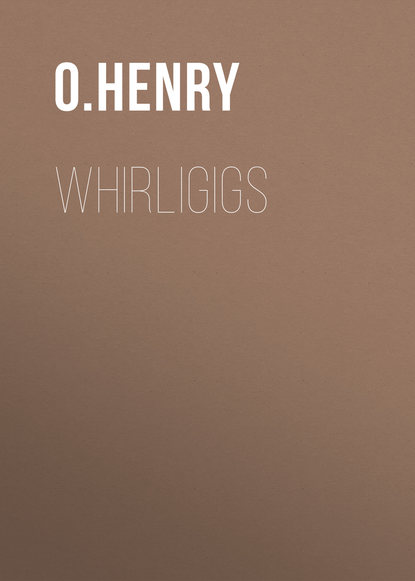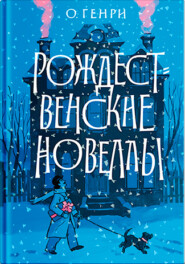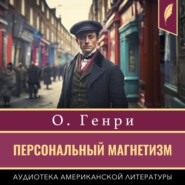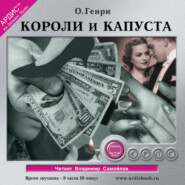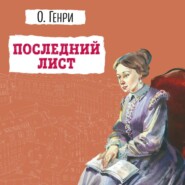По всем вопросам обращайтесь на: info@litportal.ru
(©) 2003-2024.
✖
Whirligigs
Настройки чтения
Размер шрифта
Высота строк
Поля
"I was thinking of this superior person whom you say you love. She must be a very poor sort of creature."
"I do not understand."
"Nearly," she continued, "as poor a sort of creature as yourself."
"You do not understand," said Lorison, removing his hat and sweeping back his fine, light hair. "Suppose she loved me in return, and were willing to marry me. Think, if you can, what would follow. Never a day would pass but she would be reminded of her sacrifice. I would read a condescension in her smile, a pity even in her affection, that would madden me. No. The thing would stand between us forever. Only equals should mate. I could never ask her to come down upon my lower plane."
An arc light faintly shone upon Lorison's face. An illumination from within also pervaded it. The girl saw the rapt, ascetic look; it was the face either of Sir Galahad or Sir Fool.
"Quite starlike," she said, "is this unapproachable angel. Really too high to be grasped."
"By me, yes."
She faced him suddenly. "My dear friend, would you prefer your star fallen?" Lorison made a wide gesture.
"You push me to the bald fact," he declared; "you are not in sympathy with my argument. But I will answer you so. If I could reach my particular star, to drag it down, I would not do it; but if it were fallen, I would pick it up, and thank Heaven for the privilege."
They were silent for some minutes. Norah shivered, and thrust her hands deep into the pockets of her jacket. Lorison uttered a remorseful exclamation.
"I'm not cold," she said. "I was just thinking. I ought to tell you something. You have selected a strange confidante. But you cannot expect a chance acquaintance, picked up in a doubtful restaurant, to be an angel."
"Norah!" cried Lorison.
"Let me go on. You have told me about yourself. We have been such good friends. I must tell you now what I never wanted you to know. I am – worse than you are. I was on the stage.. I sang in the chorus.. I was pretty bad, I guess.. I stole diamonds from the prima donna.. they arrested me.. I gave most of them up, and they let me go.. I drank wine every night.. a great deal.. I was very wicked, but – "
Lorison knelt quickly by her side and took her hands.
"Dear Norah!" he said, exultantly. "It is you, it is you I love! You never guessed it, did you? 'Tis you I meant all the time. Now I can speak. Let me make you forget the past. We have both suffered; let us shut out the world, and live for each other. Norah, do you hear me say I love you?"
"In spite of – "
"Rather say because of it. You have come out of your past noble and good. Your heart is an angel's. Give it to me."
"A little while ago you feared the future too much to even speak."
"But for you; not for myself. Can you love me?"
She cast herself, wildly sobbing, upon his breast.
"Better than life – than truth itself – than everything."
"And my own past," said Lorison, with a note of solicitude – "can you forgive and – "
"I answered you that," she whispered, "when I told you I loved you." She leaned away, and looked thoughtfully at him. "If I had not told you about myself, would you have – would you – "
"No," he interrupted; "I would never have let you know I loved you. I would never have asked you this – Norah, will you be my wife?"
She wept again.
"Oh, believe me; I am good now – I am no longer wicked! I will be the best wife in the world. Don't think I am – bad any more. If you do I shall die, I shall die!"
While he was consoling, her, she brightened up, eager and impetuous. "Will you marry me to-night?" she said. "Will you prove it that way. I have a reason for wishing it to be to-night. Will you?"
Of one of two things was this exceeding frankness the outcome: either of importunate brazenness or of utter innocence. The lover's perspective contained only the one.
"The sooner," said Lorison, "the happier I shall be."
"What is there to do?" she asked. "What do you have to get? Come! You should know."
Her energy stirred the dreamer to action.
"A city directory first," he cried, gayly, "to find where the man lives who gives licenses to happiness. We will go together and rout him out. Cabs, cars, policemen, telephones and ministers shall aid us."
"Father Rogan shall marry us," said the girl, with ardour. "I will take you to him."
An hour later the two stood at the open doorway of an immense, gloomy brick building in a narrow and lonely street. The license was tight in Norah's hand.
"Wait here a moment," she said, "till I find Father Rogan."
She plunged into the black hallway, and the lover was left standing, as it were, on one leg, outside. His impatience was not greatly taxed. Gazing curiously into what seemed the hallway to Erebus, he was presently reassured by a stream of light that bisected the darkness, far down the passage. Then he heard her call, and fluttered lampward, like the moth. She beckoned him through a doorway into the room whence emanated the light. The room was bare of nearly everything except books, which had subjugated all its space. Here and there little spots of territory had been reconquered. An elderly, bald man, with a superlatively calm, remote eye, stood by a table with a book in his hand, his finger still marking a page. His dress was sombre and appertained to a religious order. His eye denoted an acquaintance with the perspective.
"Father Rogan," said Norah, "this is he."
"The two of ye," said Father Rogan, "want to get married?"
They did not deny it. He married them. The ceremony was quickly done. One who could have witnessed it, and felt its scope, might have trembled at the terrible inadequacy of it to rise to the dignity of its endless chain of results.
Afterward the priest spake briefly, as if by rote, of certain other civil and legal addenda that either might or should, at a later time, cap the ceremony. Lorison tendered a fee, which was declined, and before the door closed after the departing couple Father Rogan's book popped open again where his finger marked it.
In the dark hall Norah whirled and clung to her companion, tearful.
"Will you never, never be sorry?"
At last she was reassured.
At the first light they reached upon the street, she asked the time, just as she had each night. Lorison looked at his watch. Half-past eight.
Lorison thought it was from habit that she guided their steps toward the corner where they always parted. But, arrived there, she hesitated, and then released his arm. A drug store stood on the corner; its bright, soft light shone upon them.
"Please leave me here as usual to-night," said Norah, sweetly. "I must – I would rather you would. You will not object? At six to-morrow evening I will meet you at Antonio's. I want to sit with you there once more. And then – I will go where you say." She gave him a bewildering, bright smile, and walked swiftly away.
Surely it needed all the strength of her charm to carry off this astounding behaviour. It was no discredit to Lorison's strength of mind that his head began to whirl. Pocketing his hands, he rambled vacuously over to the druggist's windows, and began assiduously to spell over the names of the patent medicines therein displayed.
As soon as be had recovered his wits, he proceeded along the street in an aimless fashion. After drifting for two or three squares, he flowed into a somewhat more pretentious thoroughfare, a way much frequented by him in his solitary ramblings. For here was a row of shops devoted to traffic in goods of the widest range of choice – handiworks of art, skill and fancy, products of nature and labour from every zone.
Here, for a time, he loitered among the conspicuous windows, where was set, emphasized by congested floods of light, the cunningest spoil of the interiors. There were few passers, and of this Lorison was glad. He was not of the world. For a long time he had touched his fellow man only at the gear of a levelled cog-wheel – at right angles, and upon a different axis. He had dropped into a distinctly new orbit. The stroke of ill fortune had acted upon him, in effect, as a blow delivered upon the apex of a certain ingenious toy, the musical top, which, when thus buffeted while spinning, gives forth, with scarcely retarded motion, a complete change of key and chord.
Strolling along the pacific avenue, he experienced singular, supernatural calm, accompanied by an unusual a activity of brain. Reflecting upon recent affairs, he assured himself of his happiness in having won for a bride the one he had so greatly desired, yet he wondered mildly at his dearth of active emotion. Her strange behaviour in abandoning him without valid excuse on his bridal eve aroused in him only a vague and curious speculation. Again, he found himself contemplating, with complaisant serenity, the incidents of her somewhat lively career. His perspective seemed to have been queerly shifted.





